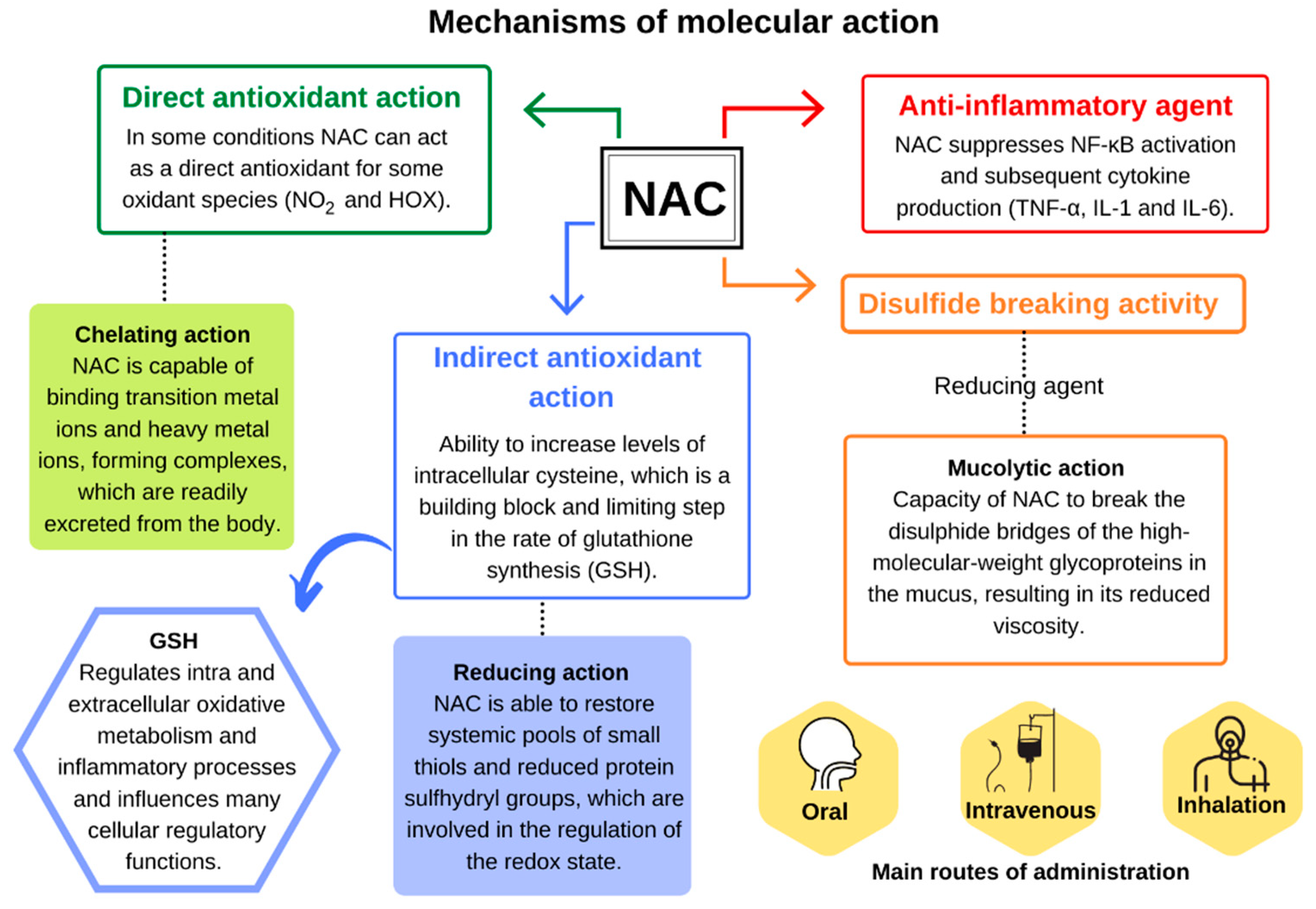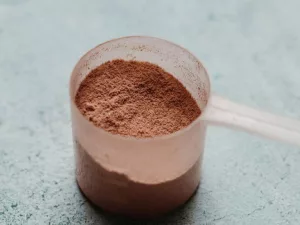N-acetyl cysteine (NAC) is a supplemental form of the amino acid cysteine, which is considered conditionally essential. NAC offers a range of health advantages, from restoring antioxidant levels to supporting cognitive function.
It’s labeled “conditionally essential” because the body can synthesize cysteine from other amino acids; however, it becomes necessary from the diet when intakes of methionine and serine are inadequate.
Cysteine occurs in many protein-rich foods, including chicken, turkey, yogurt, cheese, eggs, sunflower seeds, and various legumes.
Getting enough cysteine and NAC matters for multiple reasons, such as restoring glutathione — the body’s most potent antioxidant — and supporting respiratory health, fertility, and brain function.
Below are the top nine health benefits associated with NAC.

1. Crucial for producing the potent antioxidant glutathione
NAC is prized mainly for its role in antioxidant synthesis. Together with glutamine and glycine, NAC is required to produce and replenish glutathione.
Glutathione is among the body’s most vital antioxidants — molecules that neutralize free radicals capable of damaging cells and tissues. Antioxidants contribute to immune defense and help eliminate toxins. Evidence also indicates that antioxidant intake can lower the risk of various chronic illnesses, including cardiovascular disease.
SummaryNAC supports glutathione restoration, arguably the body’s strongest antioxidant, and so may benefit numerous health conditions.
2. Supports detoxification and helps prevent or lessen liver and kidney injury
NAC is integral to the body’s detox pathways. It can mitigate adverse effects from environmental toxin exposure (3).
Clinicians commonly administer intravenous NAC for acetaminophen (paracetamol) overdose to avert or reduce liver and kidney injury. NAC’s antioxidant and anti-inflammatory properties also make it useful in certain liver disorders.
SummaryNAC aids detoxification and is an established treatment for acetaminophen overdoses.
3. May help with mental health disorders and substance use issues
NAC helps balance glutamate, a primary neurotransmitter in the brain. While glutamate is essential for normal brain function, excess glutamate and depleted glutathione can contribute to neural damage.
This imbalance may play a role in psychiatric conditions such as bipolar disorder, schizophrenia, obsessive-compulsive disorder (OCD), and substance use disorders.
For individuals with bipolar disorder or depression, NAC may reduce symptom severity and enhance quality of life. Some evidence also supports its potential role in treating moderate to severe OCD.
Animal research suggests NAC could lessen symptoms tied to schizophrenia, including social withdrawal, apathy, and reduced attention. Preliminary studies also indicate NAC might reduce cannabis and nicotine use and cravings.
SummaryBy modulating brain glutamate, NAC may ease symptoms of certain mental health disorders and help decrease substance cravings and use.
4. Eases symptoms of respiratory illnesses
NAC can alleviate respiratory symptoms through antioxidant effects and as an expectorant that thins mucus in the airways.
As an antioxidant, NAC restores glutathione in the lungs and diminishes inflammation in bronchial tubes and lung tissue.
People with chronic obstructive pulmonary disease (COPD) suffer ongoing oxidative damage and inflammation that constrict airways, causing breathlessness and coughing.
Research indicates that NAC supplementation may improve COPD symptoms, reduce exacerbations, and slow lung function decline.
Chronic bronchitis, characterized by inflamed mucous membranes in bronchial passages, can also benefit from NAC. By loosening mucus and boosting glutathione, NAC may reduce wheezing, coughing, and respiratory flare-ups.
Beyond COPD and bronchitis, NAC may aid conditions like cystic fibrosis, asthma, pulmonary fibrosis, and nasal or sinus congestion due to allergies or infections.
SummaryNAC’s antioxidant and mucolytic properties can enhance lung function by reducing inflammation and breaking up mucus.
5. Supports brain health by balancing glutamate and restoring glutathione
NAC’s role in replenishing glutathione and regulating glutamate can promote brain health.
Glutamate influences learning, behavior, and memory, while glutathione protects brain cells from oxidative harm linked to aging.
Because NAC helps control glutamate and restore glutathione, it may be beneficial for conditions that affect cognition and memory.
In animal models, NAC has shown promise in slowing cognitive decline related to Alzheimer’s disease. It also appears to improve dopamine function and reduce symptoms such as tremors in Parkinson’s disease.
While results are encouraging, more human trials are necessary before reaching definitive conclusions.
SummaryBy restoring glutathione and modulating glutamate, NAC may offer benefits for neurodegenerative conditions like Alzheimer’s and Parkinson’s disease.
6. May enhance fertility in men and women
Some evidence shows NAC can boost male fertility.
Infertility affects roughly 15% of couples trying to conceive, with male factors accounting for nearly half of these cases. Insufficient antioxidant protection can increase free radical damage in the reproductive system, worsening male infertility.
Varicocele — enlarged veins in the scrotum often linked to oxidative damage — is one such contributor. In one study, 35 men with varicocele received 600 mg of NAC daily for three months after surgery; combining surgery with NAC improved semen quality and increased partner pregnancy rates by 22% versus controls.
NAC may also benefit older women and those with polycystic ovary syndrome (PCOS) by helping induce or support ovulation, though additional research is needed.
SummaryNAC might improve male fertility by lowering oxidative damage to reproductive cells and could assist fertility in certain women, such as those with PCOS.
7. Could help regulate blood sugar by reducing inflammation in adipose tissue
Elevated blood sugar and obesity drive inflammation within fat tissue.
This inflammation can impair insulin receptors and raise the likelihood of type 2 diabetes.
Animal studies suggest NAC may help stabilize blood glucose by diminishing inflammation in fat cells, thereby improving insulin sensitivity.
When insulin receptors function properly, they help clear sugar from the bloodstream, keeping levels in check.
Summary»MORE:Living with diabetes? Explore our top resources.By reducing inflammation in adipose tissue, NAC may lower insulin resistance and aid blood sugar control, though human evidence is limited.
8. May lower heart disease risk by preventing oxidative injury
Oxidative damage to cardiac tissue can contribute to heart disease, including strokes and heart attacks. NAC may reduce cardiovascular risk by protecting heart tissue from oxidative stress.
Studies have found NAC may support heart health and function in people with diabetes and in some postoperative cardiac patients.
SummaryNAC can help prevent oxidative damage in the heart, which may decrease the risk of cardiovascular disease.
9. Raising glutathione levels may enhance immune function
NAC, via boosting glutathione, can also support immune health.
Research on conditions tied to NAC and glutathione deficiency indicates that NAC supplementation may improve — and sometimes restore — immune responses (27, 28).
SummaryNAC’s capacity to elevate glutathione levels may strengthen immune function.
Dosage
There’s no fixed dietary recommendation for cysteine since the body can synthesize small amounts.
To make cysteine, the body requires adequate folate, vitamin B6, and vitamin B12, which are present in foods like beans, lentils, spinach, bananas, salmon, and tuna.
Although many protein-rich foods — for example, chicken, turkey, yogurt, cheese, eggs, sunflower seeds, and legumes — provide cysteine, some individuals choose NAC supplements to increase intake.
Oral NAC has relatively low bioavailability, meaning it’s not highly absorbed when taken by mouth. The commonly recommended supplemental range is 600–1,800 mg per day (29).
NAC can be delivered intravenously, orally, as an inhaled aerosol, or in liquid or powder formats.
SummaryEating protein-rich foods supplies cysteine, but NAC supplements are available to support specific therapeutic needs.
Side effects
NAC is generally considered safe for adults when used as a prescribed medication.
However, high doses may cause nausea, vomiting, diarrhea, or constipation. Inhaled NAC preparations can provoke mouth swelling, a runny nose, drowsiness, or chest tightness.
People with bleeding disorders or those taking anticoagulants should avoid NAC because it may impair clotting.
NAC has a strong, unpleasant odor that can make it difficult to tolerate. Always consult your healthcare provider before starting NAC.
SummaryAlthough NAC is typically safe as a prescription treatment, it can cause gastrointestinal upset and respiratory or oral symptoms if inhaled.
Frequently asked questions
What are the benefits of taking NAC?
In brief, NAC supplementation may help to:
- replenish glutathione, a vital antioxidant
- support detoxification
- treat acetaminophen toxicity
- regulate glutamate, a neurotransmitter tied to mood
- ease respiratory symptoms
- support cognitive functions such as memory and learning
- reduce inflammation
- help regulate blood sugar and lower insulin resistance
- protect cardiac function
- support immune health
Is it safe to take NAC every day?
Short-term daily use of NAC may be acceptable, but evidence on long-term daily safety is limited. Most clinical studies use NAC for defined therapeutic periods, often ranging from six weeks to six months, and toxicity is uncommon at low doses.
If you’re using NAC to manage or prevent a condition, consult a healthcare professional for an appropriate regimen.
Does NAC reduce inflammation?
Yes, research indicates NAC can suppress production of inflammatory mediators. Clinicians may use NAC adjunctively in conditions like liver disease, neurodegenerative disorders, mental health conditions, and heart disease, among others.
Should NAC be taken in the morning or at night?
Timing and frequency depend on your health goals and total daily dose, and your clinician may advise the optimal schedule. NAC can interact with medications and supplements, so timing may be tailored to your overall treatment plan.
Bottom line
NAC plays several important roles in health.
Best known for replenishing glutathione, it also helps regulate the neurotransmitter glutamate and aids the body’s detox mechanisms.
These properties make NAC a potential therapeutic option for multiple conditions. Discuss with your doctor whether NAC might be appropriate for your health needs.

























Leave a Reply
You must be logged in to post a comment.